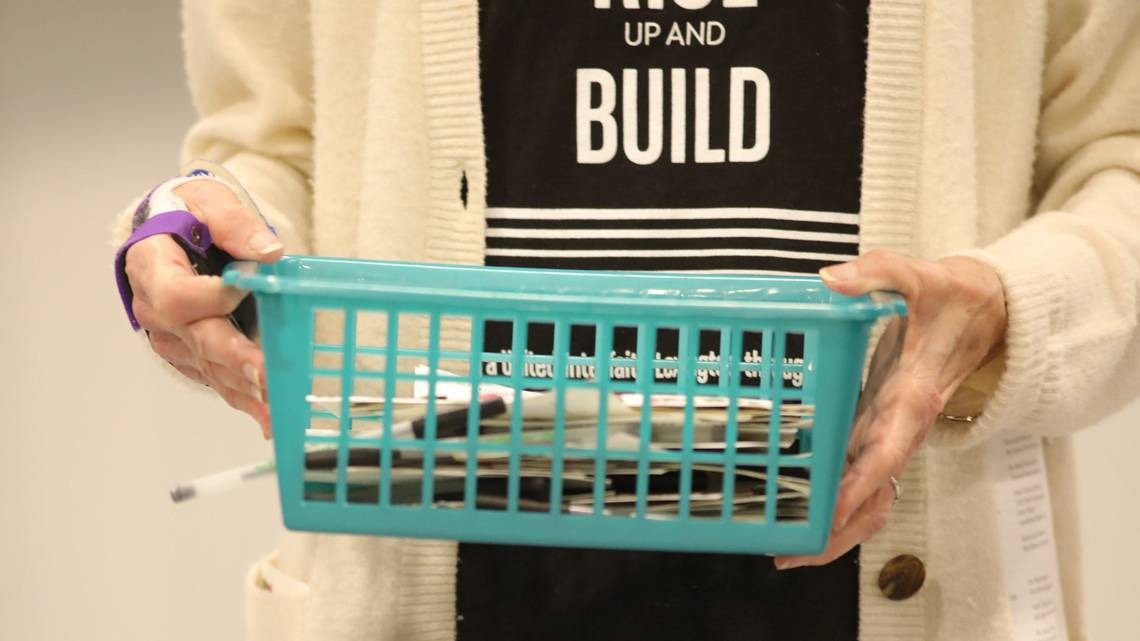By Karla Ward, Lexington Herald Leader
A coalition of 26 Lexington churches gathered Tuesday night in downtown Lexington to press the city to address the problems of transportation for those without private vehicles and care for an aging population. Rev. Joseph Owens, of Shiloh Baptist Church, told the crowd gathered at Central Bank Center that the BUILD organization has found “proven solutions” to the city’s “unjust” transportation and elder care systems. BUILD, which stands for Building a United Interfaith Lexington through Direct-Action, has been working to get Lextran to develop a microtransit program, which would provide on-demand transportation similar to a publicly-subsidized Uber or Lyft service.
The organization also wants the city to take the lead on developing a program that would help connect senior citizens to community supports that would help them live independently at home longer. BUILD said it expected 1,500 people to attend its annual Nehemiah Action Assembly Tuesday night in support of those goals. “We believe our city can and should make changes to prioritize the health and safety of all Lexingtonians,” Rev. Nathl Moore of First African Baptist Church told the crowd.
MICROTRANSIT STUDY IN THE WORKS
Vladimir Stafford told the crowd at the Nehemiah Action that a microtransit program would give him “the same access as able-bodied people.”
Stafford, who uses a wheelchair, said the city’s Wheels program, which provides transportation to those with disabilities, is his only means of transportation. A few years ago, Stafford said, Wheels dropped him off at Walmart one night, but the driver did not return to pick him up at the scheduled time. “I kept waiting and waiting,” he said. “Then my panic set in and I got scared.” After being unable to reach anyone at Wheels, he said he finally called the police, who also tried without success to get someone with the Wheels program on the phone.
Stafford said the police then called an ambulance, but Stafford said he was told the only place the ambulance could take him was the emergency room. He wasn’t sick. And, he said, he was told he’d have to leave his wheelchair at Walmart if he left in the ambulance. “I couldn’t do that,” Stafford said, his voice breaking. “My wheelchair is important to me, and it’s my legs.” “I ended up sleeping at Walmart that night,” he said.
He said he recently lost a job opportunity because of transportation concerns. “One of the things they ask is, ‘Do you have reliable transportation,’” Stafford said. “I had to tell them no, because I was scared. … Microtransit would be life-changing for me and many others.”
Extran’s board of directors agreed last week to fund a $75,000 feasibility study for a microtransit program, BUILD leaders said Tuesday night. Seven members of the Lexington-Fayette Urban County Council committed at the Nehemiah Action to keeping that funding in the Lextran budget when it is brought before the council for approval in May. The council members present were Chuck Ellinger, Jennifer Reynolds, Tayna Fogle, James Brown, Dave Sevigny, Denise Gray and Shayla Lynch. “We are one step closer to all of our neighbors having access to reliable transportation,” said Ellinger, who has worked with BUILD on microtransit and committed to providing the organization with updates as the study progresses.
ELDER CARE PROGRAM SOUGHT
Bill and Fredda Moody, ages 90 and 87, respectively, told those in attendance that as they grow older, more challenges are bound to come their way, from how to get the snow shoveled off their long driveway to how they’re going to get to the grocery store. The couple live on a mini farm, and they want to stay there.
“Our goal is to age in place with dignity, maintain social contacts and have service providers we can afford,” Bill Moody said.
BUILD organizers say that as many like the Moodys grow older, they may have too many resources to qualify for programs like Medicaid, but they may not have enough to pay for high-quality care. Belinda Snead, of Consolidated Baptist Church, said BUILD would like to see the city implement the Village to Village Network’s model, in which “villages,” or membership organizations, would be set up to help connect people to services. The network’s website says all “villages” are different, but they all “coordinate access to affordable services, including transportation, health and wellness programs, technology support, home repairs, social and educational activities.”
Snead said a nonprofit organization could run one central Lexington Village, providing staff, volunteers and other support for the program, and individual neighborhoods could set up their own smaller groups. But first, she said, BUILD needs the city to get the ball rolling by conducting a survey and drafting an administrative framework for the program. So far, BUILD leaders said they haven’t gotten much traction with that. “The city does not want to take leadership on this issue,” said Rev. David Holden, of Second Presbyterian Church. He said some Lexington neighborhoods have been trying to form villages already, but “starting a village is hard.” “If this could’ve happened without the city, it would’ve already happened,” he said.
Mayor Linda Gorton and Social Services Commissioner Kacy Allen-Bryant were invited to the Nehemiah Action Assembly, BUILD leaders said, but they did not attend. City spokeswoman Susan Straub said in a statement Tuesday night that Gorton has been an advocate for seniors. “The city has had a vibrant senior program for many years,” city spokeswoman Susan Straub said in a statement Tuesday night. “We offer many services and programs. The mayor has advocated for seniors. She recently included plans for a new senior center in her budget proposal.”
BUILD distributed postcards addressed to city officials to those in attendance Tuesday night and asked people to write to the mayor and social services commissioner in support of the villages model. “We want our city officials to know our stories,” Holden said.
View the original story here.






